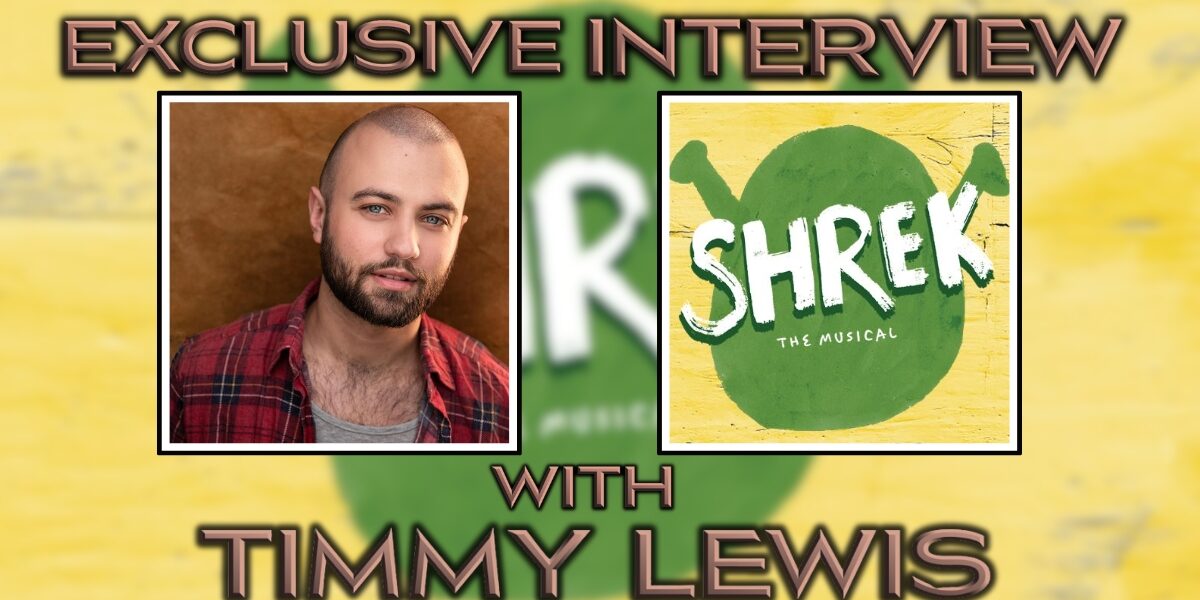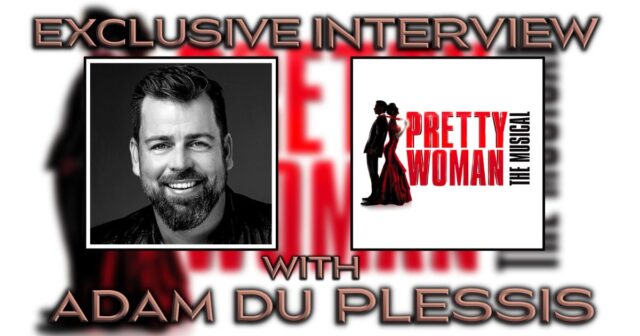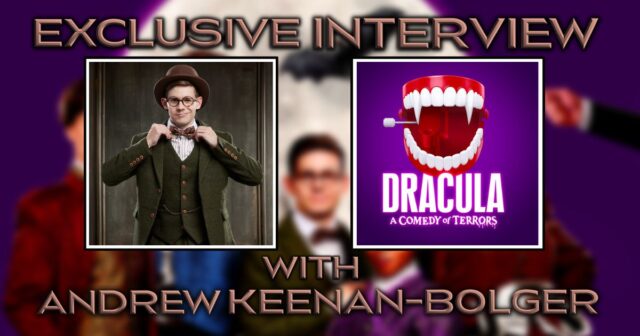I’m sure everyone in my age bracket remembers the Dreamworks film Shrek. Released in 2001, the story follows the disgruntled green orge who wants peace in his swamp. But first, he has to save a princess from a tower and return her to the Lord of the land. However, nothing is as simple as it seems, and Shrek finds himself in the middle of some hilarious hijinx and possibly even falls in love. This animated film is beloved by so many, so much so that it’s spawned three sequels, with Shrek 5 in development. It’s ripe with opportunity and has a larger-than-life story, making it the perfect tale for theatre! And so Shrek the Musical was born! I sat down with Timmy Lewis, who plays Lord Farquaad, and we chatted about his time with the show!
In this interview, Lewis discusses how his relationship with Shrek has changed from a child growing up with the film, to starring in the show’s North American Tour. He breaks down how the show has developed and grown, such as adding original music and how it’s changed from the original Broadway show. Lewis shares how he’s made the role his own, and the difficulties of shifting and letting go of the past iterations of this character to make it uniquely his.
[Note: This interview’s highlighted excerpts below have been lightly edited for clarity. Warning for mild spoilers from Shrek the Musical. You can listen to the full interview above, find it most places podcasts are available, or read on.]
Timestamps for this interview:
- 00:00 – Intro
- 00:40 – On his experience with the Shrek The Musical Tour so far.
- 02:28 – On how his relationship with Shrek changed, from childhood to being in the musical
- 04:20 – On playing Lord Farquaad and making this well-known character his own.
- 09:16 – On how changes are made to even already established shows and differences between the animated Shrek film and audience expectations.
- 15:49 – On landing jokes (or not) with an audience.
- 19:00 – The music in Shrek the Musical
- 21:30 – Something that surprised him about working on Shrek the Musical.
- 23:56 – Typical day when working the show.
- 27:25 – Timmy Lewis’ dream show or role.
Highlights from the interview with Timmy Lewis on Shrek the Musical
BK: How has this experience been for you? I know that it was announced 34 weeks ago that this was becoming a national tour. So how’s it been for you?
Timmy Lewis: It’s you know, it’s really hard to summarize into words as to how the whole experience has been because there are so many different factors to it. But, like, overall, it’s definitely, I mean, a dream come true in a lot of ways. Because, you know, growing up as a kid, I watched the movies, and then I got introduced to the musical when that came out as well. I remember seeing a production of it at a youth theater that I used to do shows at, and I never, for some reason, I just never thought that it was in my future at all because, well, I just didn’t think it was going to happen. And so when they announced it, I was excited about the concept of it, but I never necessarily put myself in it.
And so now the fact that I’m over like, eight months into the process, including auditions and everything, and a workshop and getting to work with our Tony and Pulitzer winning composer and lyricist Jeanine Tesori, our incredible creative team has just, it’s just been such a wild ride. And if you had told me a year ago right now that I would be doing this, I would have been like, okay, That’s not a thing. So being able to be here and sort of look back on how I got here and where I came from, it’s been a real blessing in many ways.
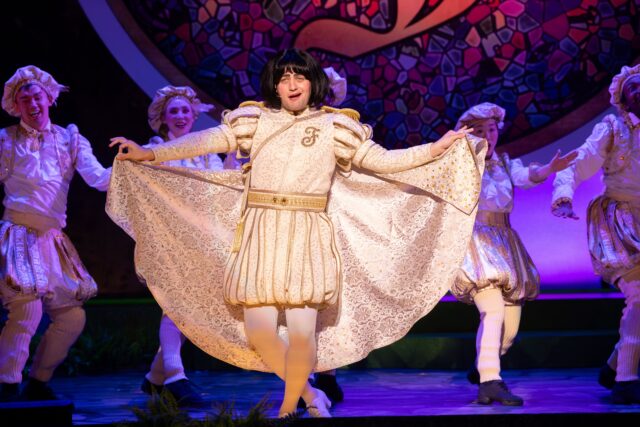
BK: How did your relationships change with Shrek having grown up, probably seeing it, to now being on stage?
Timmy Lewis: Absolutely, I think, just in terms of analyzing this story, it’s been, it’s been very different, just in terms of the meaning of it. So, okay, growing up, growing up, you’re watching Shrek, and you’re like, oh, you know, ogre and a princess, that’s funny… But then having been able to, like, really delve into the story and what the message that we are trying to convey, has been such a privilege because it has really made me realize how this silly movie from when I was four really has a tremendous impact.
Because of the idea that it’s about how anyone, not only can, but deserves to find love, not just romantic love, but also platonic love, love within yourself. Just understanding that, like kids are seeing this, and even though they may not realize that it will marinate, hopefully, it has, and that message has been being conveyed for the last 20, years, because it came out in or 23 years came out in like, 01.
So in terms of, you know, my relationship, I just it was always a movie that I loved, and the story was, you know, funny and goofy. And so now being able to not only know the story, but then say, All right, now I’m telling the story. That’s a it’s completely different relationship, and it has made me appreciate the story and the meaning behind it so much,
BK: Everybody knows Lord Farquaad, how has your view of him as a character changed? Because, you know, as a kid, we see him as the one that we have to defeat. But I’m sure that there’s a different relationship now that you’re playing him.
Timmy Lewis: Playing any character, you know, as an actor, one of your goals is to not judge your character, no matter how awful the person that you’re playing is. One of the goals is to not judge them, and to sort of find the human motivations behind the things that they do. So playing the villain is always fun in shows like this because it’s just ridiculous. And you know, you being big and goofy and silly and just like absurd is so fun. But as an actor, you know you have to find those moments where you actually have to find the truth within that.
And so for me, my relationship with the character, obviously, is different in the way that my relationship with the story has changed, in that I’ve had to find those little inklings of… Why is he like this? Why does he do the things he does? Why does he say the things he does? What? What? Why is this so important? And, you know, being able to boil down this ridiculous character that everyone you know loves and laughs at. And being able to be like, Yeah, I’m going to be that for you. I’m going to be this ridiculous person. But in my head, I’m going, Okay, but what does he want? And how? How is he going to get it? And so being able to do that and still be like, “Haha,” is hard.
BK: Right I’d say that’s a hard balance.
Timmy Lewis: It is. It really is because it’s possible to be big and truthful at the same time. And so that’s kind of the goal for me.
BK: How did you take such a well-known character and kind of make it your own?
Timmy Lewis: That was really the team. They really encouraged that with everybody, with all of us, they, they really didn’t want us to go towards the original. I mean, obviously there’s so you can only get so far away from it, without it being a different character, but in terms of the actual nuances and even the voices and the physicality, there was never any encouragement to be anything like the originals, whether that was the movie or the original musical. So they very much made sure that we had our own take on these characters. So it wasn’t.
You know, it’s a terrifying thing, sort of stepping into big shoes. Well, littler shoes, I suppose. But the original being John Lithgow, hard to beat, and especially in the original Broadway production, being Christopher Sieber, hard to beat. But they very much, from the get go, before we even within auditioning, they were very much like, this is not the original. Do your version. And so that kind of allowed a bit of freedom to say, okay, I’m not going to do it like them. They don’t want me too. So I’m not gonna.
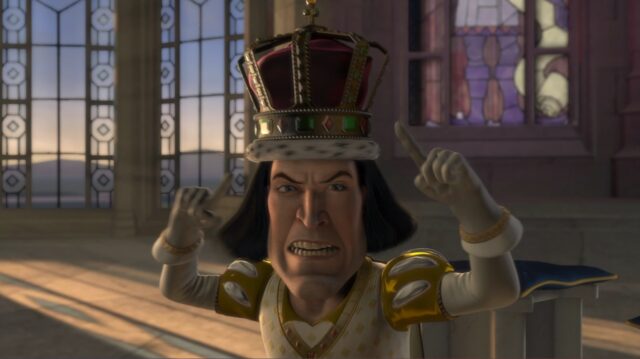
BK: With Shrek the Musical they’ve added music, obviously, to a story that didn’t have music to begin with. How do you think that enhances the story overall?,
Timmy Lewis: Well we are so lucky, because our writing team is, I mean, one of the best in the game. I mean, Jeanine Tesori is the most awarded female composer of all time. Her music, it spans, you know, she’s worked on everything from movies to operas, musicals, music for plays. And I mean, I think that was her first Tony nomination, actually, it was the music she wrote for rendition of Twelfth Night.
And David Lindsay-Abaire is just a master with words, like I said. He, I mean, he won a Pulitzer Prize for Drama, for his play Rabbit Hole. And he just, they just won the Tonys for Best Book score and musical for Kimberly Akimbo last year. And just the way they work together, it’s just, it’s kismet, honestly.
So adding music to a movie, you know, it can go one of two ways. I think that it has done nothing but serve this story. Because I think they were able to capture the essence of the story and put it into music in a way that just makes it better. Not that the movie is not phenomenal, of course, and the soundtrack from the movie is iconic. The amount of times, you know, growing up, and I heard “Funky Town”, and I was like, Shrek. It’s not, I mean, it is, but it’s not.
BK: “All star.”
Timmy Lewis: Yeah, yeah, Smash Mouth. I mean, everyone’s like, Smash Mouth, Shrek. Like you know, Smash Mouth existed before…
They were able to from the very first, from the overture, it just sets you up in this world in a beautiful, beautiful way that I think serves the story perfectly. And I think every tune is a bop.
BK: What has maybe been something that surprised you about, either your role as Lord Farquaad, or your time in Shrek the Musical?
Timmy Lewis: I think the thing that surprised me the most, honestly, was just how much like heart there is in the story. How much it really makes me cry. I really didn’t. I remember seeing it years ago at the youth theater company that I worked at, and I remember being very sentimental about the whole thing. But I think it wasn’t until I really worked on this that we really got to the root of, like, what the piece was saying that I was like, wow. Everyone thinks it’s like, oh, it’s just, it’s Shrek, you know? Not… sorry, not everybody. But there are, there’s, you know, a facet of people that think it’s a movie, it’s a kid thing, and stuff, and it’s sort of not viewed as, like a really impactful thing.
So the thing that surprised me the most was how I have been looking at, sort of what I said before, about the meaning of the actual message. And I really was, I really was shocked by how profound it is, and how it’s said in such a silly and goofy way, and how there’s, you know, there’s a number in act two that would be considered low brow to some, but you still walk away and people are crying. It’s still a beautiful thing. And that’s kind of the been the most surprising thing of how people will, my friends will see it, and they’ll send me a picture intermission, and there like, I’m crying. I’m like, Oh, wow. I never thought, Oh, I’m doing Shrek. And people are going to see it, and they’re going to cry, and they’re going to be moved, so profoundly moved by it.
Catch Shrek The Musical when it comes to a city near you
Shrek the Musical is currently on its North American Tour. Be sure to check it out when it comes to your city, as this is one you don’t want to miss!
Exclusive Interview: Adam Du Plessis Talks Pretty Woman The Musical
Exclusive Interview: Andrew Keenan-Bolger from Dracula: A Comedy of Terrors

